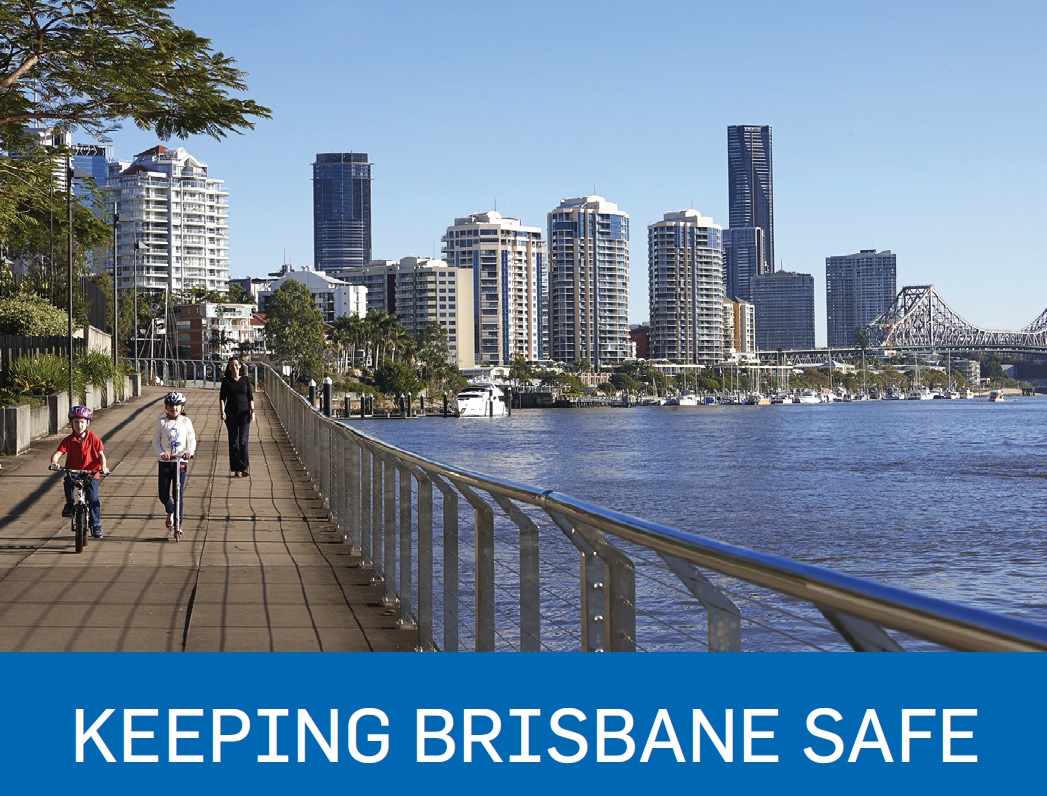Personal safety
Brisbane is a safe and vibrant 24-hour city. Our friendly and welcoming attitude, beautiful subtropical lifestyle and culturally diverse population, makes us a great city to visit and live in.
Like any big city, crime does happen. The safety of all residents and visitors is a major priority for Brisbane City Council.
It’s important that residents and visitors take their own personal safety seriously and are aware of their personal safety at all times.
Simple safety tips
- Be aware
- Stay alert to your surroundings at all times.
- Remove your headphones and be aware of those around you.
- Be smart
- Choose safe routes in well-lit, populated areas with lots of other people around.
- Be prepared
- Before you head out, plan how you will get there and how you will get back. Identify safe locations along the route such as a friend’s house, local shop or cafe.
- Trust your instincts
- If you feel unsafe, uncomfortable or feel something just isn’t right, get out of the situation straight away.
- Be heard
- If you are threatened or attacked, shout as loudly as you can. Yell for help and make a lot of noise to draw attention to yourself.
- Report it
- If you are a victim of crime or are in danger, contact the Police on 000. Remember, the police are there to help you.
For more tips and information on staying safe in Brisbane, download the:
Home Safety
House break and enters are one of the most common crimes. In many instances house break-ins are crimes of opportunity with entry gained through an open or unlocked door or window.
Good home security is as simple as the following three basic steps:
- Make it as difficult as possible for an offender to gain entry i.e. install and use key operated locks on doors and windows, don’t place keys under door mats or in obvious places.
- Make it as difficult as possible for an offender to exit with your property i.e. use the key-operated locks on doors and windows, make sure alarms are functioning.
- Make it as difficult as possible for an offender to want to steal your property i.e. engrave or microdot all items of value.
Property owners can greatly reduce the risk of becoming a victim of a burglary by implementing measures to improve the security of their home. These measures can be simple and don’t necessarily need to cost a lot of money. For example:
- Get to know your neighbours. Exchange telephone numbers and keep and eye on each other’s homes. Observant neighbours can reduce prowling, loitering and burglary by reporting suspicious people or vehicles to police.
- Join your local Neighbourhood Watch group.
- Even when you are at home, be aware of your home security and ensure doors and windows are secured, particularly in areas that are unoccupied.
- Before you hire a professional house cleaner or gardener, check all references thoroughly.
- Secure your home when you leave by locking all doors and windows. Many burglars simply enter through an unlocked door or window. Remove keys from internal doors and windows when you are not at home.
- If you have a faulty alarm that frequently goes off, get it fixed immediately and tell your neighbours that it’s been repaired. Many people ignore an alarm that goes off regularly.
- Ask for credentials from all salespersons who request entry to your home. If you’re doubtful, check with the person’s office before letting him or her in.
- Give your home the “lived in” look when you’re out by leaving a light on and the radio playing. Timing devices are effective for this. When you are not at home, adjust the ringing volume down on your telephone so it is not obvious the home is unoccupied.
- Keep cash, keys and valuables out of sight and out of easy reach.
- Don’t leave notes on the door as they suggest that no one is home.
- Don’t leave a house key under the door mat or a pot plant, in the letterbox or in other obvious places.
- Ensure you house/unit number is clearly visible so it can be located quickly in an emergency.
- Mark valuable property using the Property Identification System.
- Know which doors and windows you can use as an exit in an emergency so you can leave quickly and safely.
- In an emergency always ring triple zero (000). Use the speed dial of your telephone to record other important numbers.
If you do hear an intruder in the home, don’t risk injury. Dial triple zero (000) at the earliest opportunity, leave the house immediately and go to a neighbour or somewhere safe to contact and wait for police. Learn more about confrontations in the home.
If you come home and find your home broken into, report it to police and do not touch anything. Forensic evidence can easily be destroyed and it is important for police to see your home exactly as it was left to obtain evidence.


